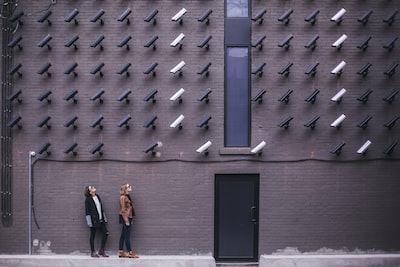Screenwriters pour their hearts and souls into crafting captivating narratives that transport audiences into a different dimension. But the digital age has ushered in a new breed of threats – hackers, phishers, and cybercriminals seeking to exploit vulnerable writers.
In this age of fierce interconnectedness, email protection for screenwriters becomes paramount. One may wonder, how can safeguarding personal correspondence contribute to the creative process? Well, consider this: an errant click on a malicious link, an unchecked attachment, or an unsecured network could potentially expose cherished ideas, scripts, or even delicate negotiations with studios.
It is within this delicate dance of artistry and security that email protection takes center stage, shielding wordsmiths from the perils of a click gone wrong.
In a world where plots are constantly under scrutiny, screenwriters find themselves in a relentless battle to protect their creative endeavors. As if navigating the treacherous waters of Hollywood wasn’t challenging enough, the advent of technology has added an entirely new layer of complexity.
It is with this backdrop that the unspoken need for email protection for screenwriters emerges, like a phantom lurking in the shadows of a script. Safeguarding your scripts from prying eyes becomes more than a mere precautionary measure; it becomes a survival strategy.
But how does one secure their ideas in a digital landscape where confidentiality seems like a forgotten relic? Enter the untold secrets of email protection, a clandestine world that dances delicately on the tightrope of mystery and necessity.The first puzzle piece lies in encryption, an age-old defense mechanism that has found new life in the realm of email security.
Imagine your screenplay encrypted like an ancient scroll, visible only to those who possess the key. With advanced encryption technologies, screenwriters can fortify their scripts, rendering them impervious to unauthorized access.
Gone are the days of sleepless nights worrying about your ideas falling into the wrong hands. Encryption breathes new life into a writer’s quiet desperation, providing a shield against the looming threat of intellectual property theft.
But email protection for screenwriters does not stop at encryption; it delves into the depths of multi-factor authentication, a formidable force that guards against even the most skilled hackers. By requiring multiple layers of verification, email providers give screenwriters a fighting chance in a world filled with digital adversaries.
Gone are the days when a simple password held the lion’s share of responsibility; now, screenwriters can rest easy knowing their screenplay is concealed under virtual lock and key.Perplexity shrouds the minds of those who dare to venture into the world of email protection for screenwriters.
How does one navigate this labyrinth of jargon and technicalities? Fear not, fellow creatives, for help is at hand. A plethora of resources exist to guide writers through this perilous journey, equipping them with the knowledge and tools to safeguard their scripts.
From online tutorials to dedicated consultants, the information age has birthed a support system that stands firmly beside every screenwriter in their quest for protection.The tonality of this sacred pursuit varies, from a sense of urgency to a cautious optimism.
The urgency stems from the inherent vulnerability of a screenwriter’s work, constantly hanging in the balance between idea and execution. Yet, amidst the chaos, a glimmer of hope emerges.
With each email sent and received, fear subsides and the realization dawns that there is still beauty in this industry. Email protection for screenwriters serves as a reminder that even in the darkest corners of creativity, a flicker of light can guide us towards a future where our scripts are truly our own.
Burstiness punctuates the exploration of these untold secrets, mirroring the erratic nature of a screenwriter’s journey. Just as ideas burst forth in moments of inspiration, so too does the quest for email protection burst forth with a sense of urgency.
This article is a mere starting point, a spark in the vast sea of information awaiting those who seek to guard their creations. So, dear screenwriters, dive into the world of email protection as you would dive into a story, for within its unexplored depths lies the potential for untold success.
Embrace the secrets, conquer the unknown, and let your scripts flourish in a world that is finally yours to protect.
Table of Contents
The importance of email protection for screenwriters
In Hollywood, where movie ideas are highly sought after and leaks can be career-breaking, email protection for screenwriters has become increasingly important. With digital communication, the risk of scripts falling into the wrong hands has increased, leading screenwriters to find new ways to safeguard their ideas.
Enter email encryption for screenwriting, a game-changing solution that ensures confidential scripts remain secure. This technology uses advanced encryption algorithms, making it virtually impossible for unauthorized individuals to access email contents.
From top executives to emerging talent, the adoption of email encryption has become a crucial step in protecting intellectual property. With this revolutionary tool, screenwriters can now confidently send their scripts, knowing their creative visions will remain impenetrable to hackers, competitors, and spoilers.
The era of email vulnerability for screenwriters is over.
Common email security risks faced by screenwriters
Screenwriters in the digital age face numerous email security risks. These risks endanger the confidentiality of their carefully crafted scripts.
The desire to see their work on the big screen can quickly turn into a nightmare if sensitive content falls into the wrong hands. Email accounts can be hacked, and unauthorized recipients may accidentally receive confidential material.
These dangers are widespread and constantly changing. To protect their scripts, scriptwriters must remain vigilant.
They should implement robust email encryption and use secure file sharing platforms to minimize risks. Additionally, it is crucial to have a sound understanding of copyright laws and non-disclosure agreements to safeguard intellectual property.
In this fast-paced industry, securing scripts is not just a precautionary measure but a necessity for screenwriters’ survival and success in an age of increasing cyber threats.
Strategies for secure script delivery via email
The film industry is always changing, where ideas are valuable and a single script can make or break a career. Protecting your work from being seen by others is very important.
Whether you’re a experienced screenwriter or just starting out, it’s crucial to keep your scripts secure when sending them through email. How can you prevent unauthorized access to your work? There are a few strategies you can use.
Start by using encrypted email services, like ProtonMail or Tutanota, which have maximum security with end-to-end encryption. Also, make sure to use strong and unique passwords for your email accounts.
Enable two-factor authentication whenever possible. Additionally, consider watermarking your scripts with your name or a unique identifier.
This way, they can be easily traced if they end up in the wrong hands. Don’t let your hard work be seen by others.
Take the necessary precautions to keep your scripts safe and make sure your creative work remains confidential.
Encrypting email attachments for enhanced protection
In an age of constant hacking and high levels of cyber-attacks, protecting your scripts from being seen by others is more important than ever for screenwriters. While secure email providers offer some protection, adding an extra layer of security by encrypting your email attachments is crucial.
Encryption software or services like PGP (Pretty Good Privacy) can transform sensitive script files into unreadable ciphertext, making it very difficult for unauthorized individuals to access your work. It is important to remember that the strength of your passwords and encryption algorithms greatly affect the effectiveness of encryption.
To ensure the security of your email scripts, it is recommended to regularly update passwords, use strong and unique combinations, and consider two-factor authentication for added protection. By following these practices, you can be confident that your scripts are safe from prying eyes and cyber threats.
Best practices for password management and email authentication
Are you a screenwriter with a great script that you’re worried might fall into the wrong hands? You’re not alone. In the competitive world of show business, keeping your work secure is essential.
But how can you make sure that your brilliant ideas don’t get stolen or leaked? In this article, we will explore the secrets of email protection for screenwriters. We’ll provide you with tips for password management and email authentication.
From two-factor authentication to secure email solutions, we’ll discuss the different options available to safeguard your scripts from prying eyes. So sit back, relax, and let us guide you through the world of email security, so you can focus on what you do best – writing captivating screenplays.
Get ready to enhance your email protection. Secure email solutions for screenwriters are vital in today’s digital age.
Additional tools and resources for email security in the industry
Hollywood is a constantly changing world, where screenwriting is a delicate craft that needs to be protected in order to maintain the integrity of a script. Email has become a common way for writers, agents, and producers to share sensitive material.
However, this convenience also comes with risks, as others could intercept and steal these valuable ideas. Therefore, screenwriters need to prioritize implementing strong email protection measures.
Thankfully, there are additional tools and resources available to enhance the security of these electronic correspondences and ensure the confidentiality of scripts. Encrypted email services, two-factor authentication, and virtual private networks are just a few technological advancements that can provide screenwriters with peace of mind.
It is crucial to invest in script security to prevent groundbreaking ideas from falling into the wrong hands.
Cleanbox: Streamlining Email Management and Protecting Screenwriters from Online Threats
Cleanbox offers essential email protection for screenwriters, alleviating the stress of a cluttered inbox. With its revolutionary tool, Cleanbox streamlines the email experience, enabling a seamless workflow.
By harnessing advanced AI technology, Cleanbox has the ability to sort and categorize incoming emails, effectively identifying and warding off potential phishing attempts and malicious content. This ensures that screenwriters can focus their attention on the most important messages without the fear of falling victim to online threats.
Cleanbox‘s sophisticated algorithms prioritize messages, allowing screenwriters to easily identify and respond to crucial communications. These key features not only declutter the inbox but also safeguard vital information, providing peace of mind for screenwriters who handle sensitive and confidential content.
Cleanbox truly revolutionizes email management, making it an indispensable tool for screenwriters seeking a more efficient and secure workflow.
In Short
In an industry engulfed by secrecy and cutthroat competition, screenwriters have long grappled with the daunting task of protecting their intellectual property. With the advent of digital communication, the vulnerability of scripts sent via email has become increasingly evident.
This begs the question: how can screenwriters safeguard their creative work in the realm of cyberspace? While no system is foolproof, there are several measures that can be taken to fortify email protection, allowing these storytellers to breathe a little easier. Encryption software, though not infallible, can provide a crucial layer of defense against prying eyes and malicious hackers.
Implementing strong passwords, along with two-factor authentication, can further fortify the walls protecting these digital treasures. Screenwriters should also remain vigilant of phishing scams, treading carefully when opening email attachments or clicking on suspicious links.
Additionally, employing watermarking techniques can serve as a visual deterrent, discouraging widespread reproduction of confidential scripts. As technology continues to evolve, so must our methods of protection.
It is imperative for screenwriters and those in the entertainment industry to stay informed about the latest email security advancements and adapt their practices accordingly. Let us not undermine the immense power of a stolen script, capable of generating millions in profits for unscrupulous individuals.
Therefore, it is not enough to simply write captivating narratives; screenwriters must also become guardians of their own visions. The dissemination of their stories should remain a privilege, selectively shared with trusted parties rather than vulnerable to the whims of cyberspace.
By embracing the importance of email protection, screenwriters can ensure their creations remain their own, safeguarding the future of storytelling in the digital age.








 in Wyoming
in Wyoming